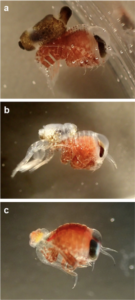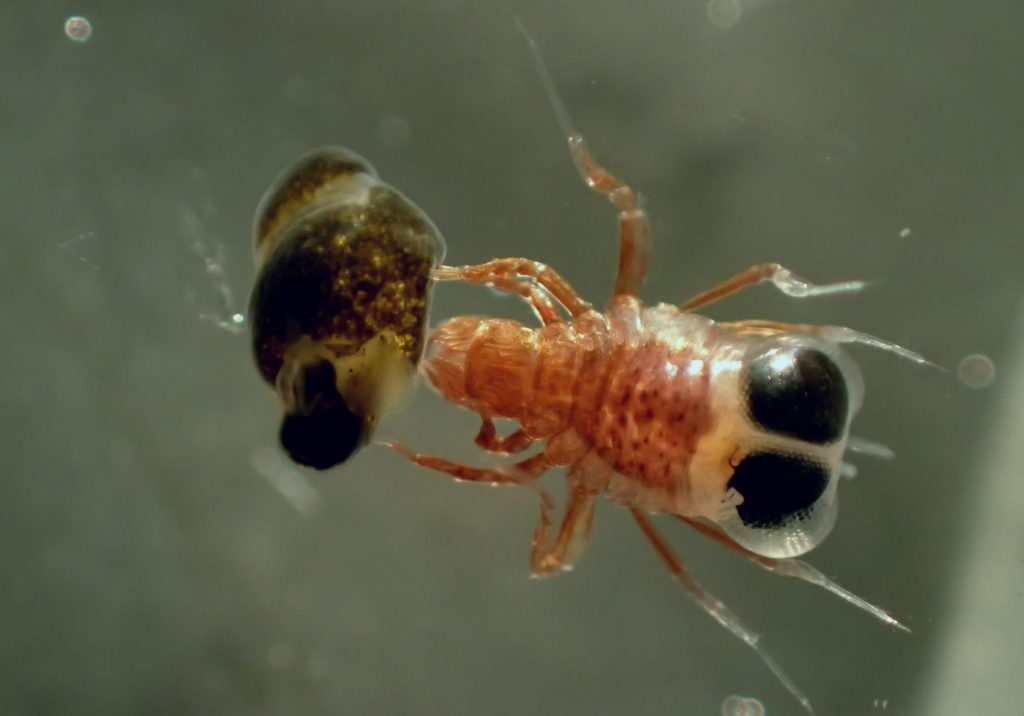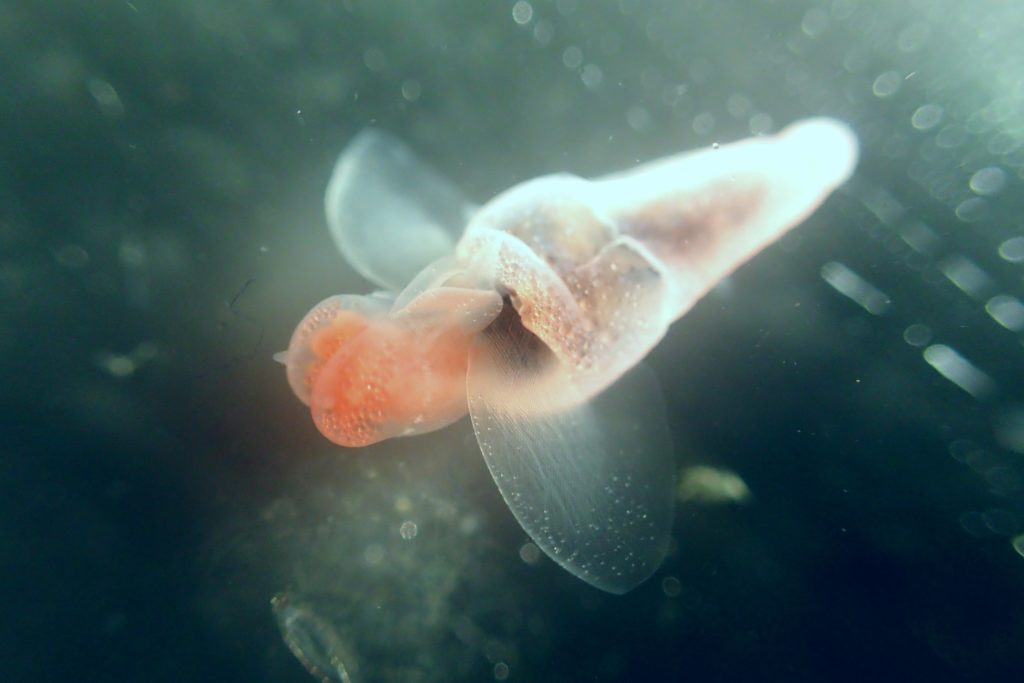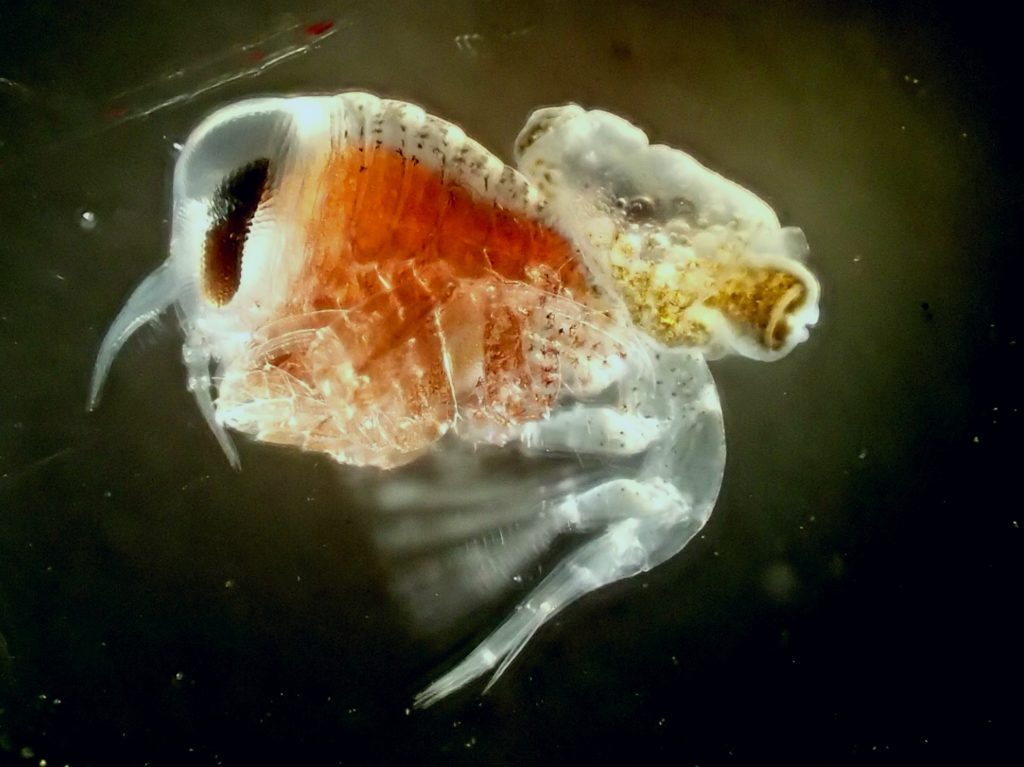The sea is for most of its inhabitants a vast place where danger can get to you anywhere. This might be especially true when you are one of those small and mostly harmless species spending your life slowly swimming around, minding your own business (eating and reproducing), somewhere in the upper 200m or so of water. Because there are many big-mouthed and possibly big eyed animals out there that think you might be one of the best things there is to eat.
For the small pelagic (living in the open ocean and not close to the sea floor) amphipods in the suborder Hyperiidea this is one of the dangers of everyday life. The genus Hyperiella can be found in the Southern Ocean, and one of their main predators are the icefishes (Nototheniidae). So what do you do when you are a small and quite tasty animal that is not a very fast swimmer and there are a lot of fishes out there to eat you?
Don´t panic!

Hyperiella antarctica with Spongiobranchaea australis (a and b) and Hyperiella dilatata with Clione limacina antarctica (c). Figure 2 Havermans et al 2018.
Two of the three Hyperiella-species have found a quite ingenious solution. They hitchhike with a group of other small slow-swimming pelagic animals – pteropods. Pteropods (from the greek “wing-foot”) are sea snails (gastropods). Hyperiella australis pics up a life with Spongiobranchaea australis, and Hyperiella dilatata hangs out with Clione limacina antarctica. Both pteropods are from the group we call Sea Angels (Gymnosomata), and in a way they are saving angels for the amphipods: the ice fish don´t eat these strange couples. Why?
It seems the pteropods have developed a chemical protection against predation. They obviously taste extremely bad, for observations of icefish trying to eat the hitchhiking amphipods together with the pteropods result in them both being spit out again. Most times, the fish would see what it thought was good food, and then swim away when they discovered what they were almost eating. Not so very strange, then, that Hyperiella are holding on to their colleagues for their life!
It might not be hitchhiking after all, but rather kidnapping – or brute force. The amphipods hold on to the pteropods with their to-three hindmost pairs of legs, and keep the sea angel on their back – much like a backpack. Observations are that they are repositioning them there all the time – almost like kids running with bumpy backpacks on the way to school. They don´t even let go when the researchers preserve them!
What this treatment do to the pteropods we still don´t know. But it does not seem they are able to eat very much when being held hostage as chemical defence-backpacks. That may not be the biggest problem in a short time-scale – their Arctic relatives have been shown to survive almost a year without food. What happens when they really get hungry we do not know. The amphipods are still able to feed, even though the pteropods can be up to 50% of the amphipod size. Maybe the pteropods do some of the swimming for the amphipods?
This behaviour is much more common close to the coast than in the open sea: close to the McMurdo area, 75% of the Hyperiella were seen hitching with a pteropod. Now we know that this pairing can be found in the open sea, and maybe is it more common that we think. It is not the first thing we have looked for so far when examining samples. When the University Museum of Bergen joins the Norwegian Polar Institute and the Institute of Marine Research to the Southern Ocean in the austral autumn this coming March, we will make a special effort to search for such collaborators.
Anne Helene
Literature
Havermans C, Hagen W, Zeidler W, Held C, Auel H 2018. A survival pack for escaping predation in the open ocean: amphipod-pteropod associations in the Southern Ocean. Marine Biodiversity https://doi.org/10.1007/s12526-018-0916-3
McClintock JB, Janssen J 1990. Pteropod abduction as a chemical defence in a pelagic Antarctic amphipod. Nature 346:424-426.



